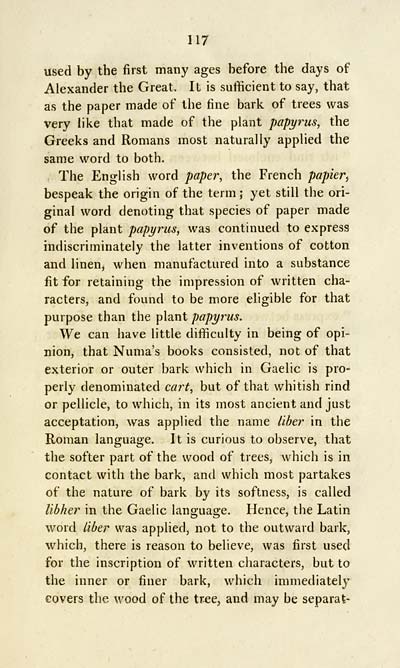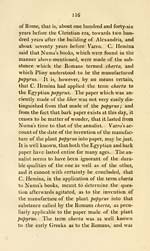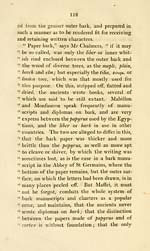Download files
Complete book:
Individual page:
Thumbnail gallery: Grid view | List view

117
used by the first many ages before the days of
Alexander the Great. It is sufficient to say, that
as the paper made of the fine bark of trees was
very like that made of the plant papyrus, the
Greeks and Romans most naturally applied the
same word to both.
The English word paper, the French papier ^
bespeak the origin of the term ; yet still the ori-
ginal word denoting that species of paper made
of the plant papyrus, was continued to express
indiscriminately the latter inventions of cotton
and linen, when manufactured into a substance
fit for retaining the impression of written cha-
racters, and found to be more eligible for that
purpose than the plant papyrus.
We can have little difficulty in being of opi-
nion, that Numa's books consisted, not of that
exterior or outer bark which in Gaelic is pro-
perly denominated cart, but of that whitish rind
or pellicle, to which, in its most ancient and just
acceptation, was applied the name liber in the
Roman language. It is curious to observe, that
the softer part of the wood of trees, which is in
contact with the bark, and which most partakes
of the nature of bark by its softness, is called
libher in the Gaelic language. Hence, the Latin
word liber was applied, not to the outward bark,
which, there is reason to believe, was first used
for the inscription of written characters, but to
the inner or finer bark, which immediately
covers the wood of the tree, and may be separat-
used by the first many ages before the days of
Alexander the Great. It is sufficient to say, that
as the paper made of the fine bark of trees was
very like that made of the plant papyrus, the
Greeks and Romans most naturally applied the
same word to both.
The English word paper, the French papier ^
bespeak the origin of the term ; yet still the ori-
ginal word denoting that species of paper made
of the plant papyrus, was continued to express
indiscriminately the latter inventions of cotton
and linen, when manufactured into a substance
fit for retaining the impression of written cha-
racters, and found to be more eligible for that
purpose than the plant papyrus.
We can have little difficulty in being of opi-
nion, that Numa's books consisted, not of that
exterior or outer bark which in Gaelic is pro-
perly denominated cart, but of that whitish rind
or pellicle, to which, in its most ancient and just
acceptation, was applied the name liber in the
Roman language. It is curious to observe, that
the softer part of the wood of trees, which is in
contact with the bark, and which most partakes
of the nature of bark by its softness, is called
libher in the Gaelic language. Hence, the Latin
word liber was applied, not to the outward bark,
which, there is reason to believe, was first used
for the inscription of written characters, but to
the inner or finer bark, which immediately
covers the wood of the tree, and may be separat-
Set display mode to: Large image | Transcription
Images and transcriptions on this page, including medium image downloads, may be used under the Creative Commons Attribution 4.0 International Licence unless otherwise stated. ![]()
| Early Gaelic Book Collections > Ossian Collection > Thoughts on the origin and descent of the Gael > (129) |
|---|
| Permanent URL | https://digital.nls.uk/82235992 |
|---|
| Description | Selected books from the Ossian Collection of 327 volumes, originally assembled by J. Norman Methven of Perth. Different editions and translations of James MacPherson's epic poem 'Ossian', some with a map of the 'Kingdom of Connor'. Also secondary material relating to Ossianic poetry and the Ossian controversy. |
|---|
| Description | Selected items from five 'Special and Named Printed Collections'. Includes books in Gaelic and other Celtic languages, works about the Gaels, their languages, literature, culture and history. |
|---|

